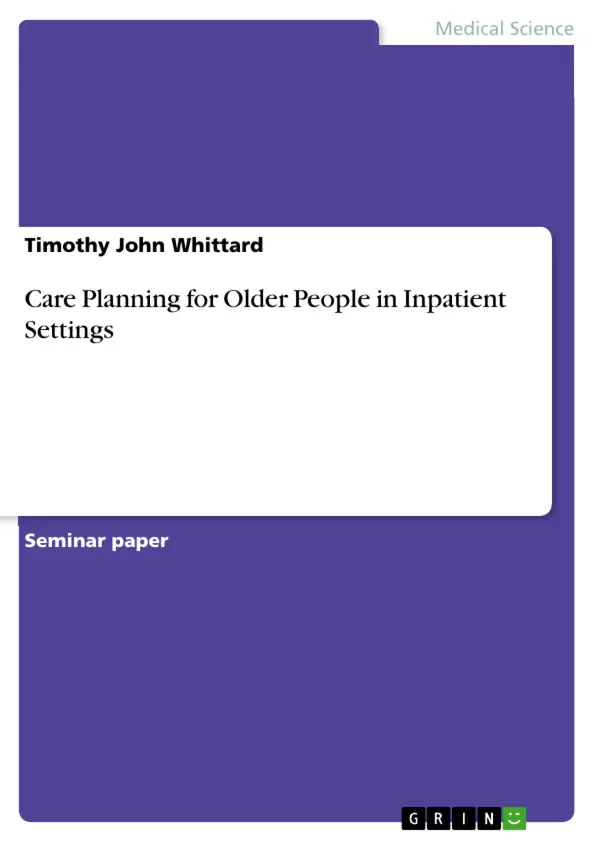Following a recent CQC inspection, it has been highlighted that care plans should not just be present and in-date (which is audited for ICP purposes); but their contents should reflect quality (which is not presently audited for ICP purposes) and as named-nurses we are responsible for this.
As a result, there is now a demand for us to have a greater focus on the quality of our written care plans; ensuring that interventions are listed exhaustively and in detail.
The ICP audit is currently being reviewed, and will soon include measures which will help to identify and qualify the quality of our care plans within the audit.
Inhaltsverzeichnis (Table of Contents)
- INTRODUCTION
- OBJECTIVES
- WHY DO WE CARE PLAN?
- WHAT MAKES A GOOD CARE PLAN?
- CARE PLAN FORMAT
- ROLE OF THE NAMED-NURSE
- THE FRANCIS REPORT
- CARE PLANNING FOR PEOPLE WITH DEMENTIA
- WHEN SHOULD CARE PLANS BE REVIEWED?
- MULTIDISCIPLINARY CARE PLANS
Zielsetzung und Themenschwerpunkte (Objectives and Key Themes)
This document aims to provide a comprehensive overview of care planning in a hospital setting. It focuses on the importance of high-quality care plans and the role of named nurses in their development and implementation.
- Importance of Quality Care Planning
- Role of the Named Nurse
- Impact of the Francis Report on Care Planning
- Care Planning for People with Dementia
- Regular Review and Evaluation of Care Plans
Zusammenfassung der Kapitel (Chapter Summaries)
- INTRODUCTION: This chapter introduces the importance of high-quality care plans and the need for a greater focus on their quality. It highlights the recent changes in audit requirements and the responsibility of named nurses.
- OBJECTIVES: This chapter outlines the key objectives of the document, including discussions on the reasons for care planning, the role of named nurses, and the impact of the Francis Report.
- WHY DO WE CARE PLAN?: This chapter explores the numerous reasons for creating and implementing care plans, emphasizing the need for personalized and individualized care.
- WHAT MAKES A GOOD CARE PLAN?: This chapter delves into the key elements of a high-quality care plan, emphasizing factors such as patient involvement, individualization, accessibility, and clarity.
- CARE PLAN FORMAT: This chapter discusses the standard format of care plans, outlining the three main sections (problem, goal, interventions) and the importance of regular review and evaluation.
- ROLE OF THE NAMED-NURSE: This chapter elaborates on the crucial role of named nurses in the care planning process, highlighting their responsibilities in coordinating care and building therapeutic relationships with patients.
- THE FRANCIS REPORT: This chapter examines the findings of the Francis Report and its impact on care planning, emphasizing the importance of comprehensive and detailed care plans to protect patients from harm.
- CARE PLANNING FOR PEOPLE WITH DEMENTIA: This chapter specifically addresses the unique needs of people with dementia, highlighting the importance of individualized care plans, regular reviews, and consideration of diverse needs and preferences.
- WHEN SHOULD CARE PLANS BE REVIEWED?: This chapter outlines the key reasons for reviewing care plans, emphasizing the need for regular updates as patient needs change.
Schlüsselwörter (Keywords)
This document focuses on the importance of quality care planning, the role of named nurses, the impact of the Francis Report, and specific considerations for care planning for people with dementia. It emphasizes the need for individualized, comprehensive, and accessible care plans that are regularly reviewed and evaluated to meet the evolving needs of patients.
Frequently Asked Questions
Why is care planning essential in a hospital setting?
Care planning ensures that patient care is personalized, individualized, and consistent. It provides a roadmap for interventions and goals, helping to improve patient outcomes and safety.
What is the role of a "named nurse" in care planning?
A named nurse is responsible for the quality of written care plans, ensuring they are detailed, up-to-date, and reflect the actual needs of the patient through continuous evaluation.
What are the components of a good care plan?
A high-quality care plan typically includes three main sections: the identified problem, the desired goal, and the specific interventions required to achieve that goal.
How did the Francis Report impact care planning?
The Francis Report highlighted the need for rigorous standards in patient care. It emphasized that care plans must be more than just "present"—they must be comprehensive and detailed to protect patients from harm.
What specific considerations are needed for dementia care plans?
Care plans for people with dementia must be highly individualized, taking into account their unique preferences, diverse needs, and requiring frequent reviews as their condition changes.
- Quote paper
- Timothy John Whittard (Author), 2015, Care Planning for Older People in Inpatient Settings, Munich, GRIN Verlag, https://www.grin.com/document/476713



